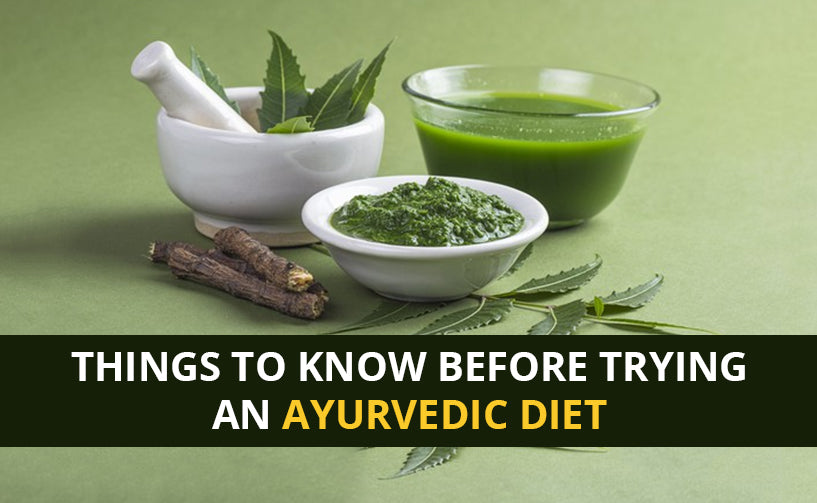Native to India, Ayurveda is a 5000 years old system of nutrition and medicine that was developed alongside yoga as the best means to prevent illness and imbalance. It seeks to create a healthy and delicate balance between the mind, body and spirit through a series of diet, exercise, and lifestyle practices, including sleep, intuitive eating, and mindful living. An Ayurvedic diet provides directions to incite mindful eating and consuming foods that are appropriate for your dosha, or constitutional type. The energy of each dosha helps determine what to eat to boost health, prevent or manage diseases, and maintain overall health and wellness.

Unlike most trendy fad diets and western biomedicine that either works only short-terms or puts you at a disadvantage due to their crazy restrictive technique, Ayurveda diet includes ingredients that are purely herbal beneficial for all, with no side effects. It provides a holistic approach to health and wellness that brings together the mind, body, and soul and focuses on preventative rather than curative measure, making it a more preferable option to others.
It is important to know the basics of anything before committing your time and energy to it. Here are 8 things you should know before diving into the age-old wisdom of Ayurveda and utilizing it to create health, vitality and energy through food:
- The Three Doshas
Just like the five elements in Chinese philosophy, there are five great elements or energies viz. space, air, fire, water, and earth that makes up for the three main ‘doshas’ in Ayurveda. They are, the Vata (space and air), the Pitta (fire and water), and lastly, the Kapha (earth and water). Each person is composed of a unique combination of these energies based on their physical, mental, and emotional attributes and one type of energy is typically more prominent than the others, called the dosha.
Vata (air and space): A person who has predominant Vata energy often have a small frame, thin stature, small eyes with usually rough or thick hair. They are typically active, creative, lively, and smart thinker. They are also known to have irregular digestion and easily feels fatigued and anxious.
Pitta (fire and water): Individuals with predominant Pitta energy have a moderate physical frame with silky smooth hair. They are typically known to be intelligent and resourceful but can be short-tempered if their energy goes out of balance. They are also known to have a strong appetite and metabolism but are also prone to high blood pressure and heart disease.
Kapha (earth and water): People with predominant Kapha energies typically are large in frame with smooth or oily skin. They are known to be calm, strong and enduring but can be possessive when their energy balance is off. They usually have a slow metabolism and may struggle with diabetes, asthma or depression.
- What’s Your Dominant Dosha?
As per Ayurveda, out of the three doshas, the one dosha that dominates the rest is what characterized and defined a person’s wellbeing. Since each dosha has specific foods and diet associated with it, it is crucial to learn and identify what your dominant dosha is to know where and how to find balance within yourself. It is important to consult an Ayurvedic expert to help figure out what dosha you are to restore balance in your diet and life in general.
- It Focuses On Whole Foods
Unlike many diets that focus mainly on certain food groups while restricting on other food groups, an Ayurvedic diet laid emphasis on the importance of daily consumption of whole foods for a balanced and healthy diet. Ayurvedic diet is especially rich in dietary fibres and is tremendously healthy for the digestive system. Plant-based foods that are nutritious, high-quality and fresh are necessary for a sound mind and body, regardless of what dosha resonates with you.
- Ayurvedic Diet and Lunchtime
Ayurvedic diet believes that lunch is the most important meal of the day and should not be ignored. As per Ayurveda, the digestive fire, or ‘agni’, has a close association with the sun. Our 'digestive fire' is believed to be at its strongest between Noon to 2 pm when the sun is at its peak. Therefore, according to Ayurveda, it is recommended to consume the largest proportion of nutrients during this hour.
- It Embraces All Six Tastes
An Ayurvedic diet believes that the taste of our foods can play an important role in maintaining a healthy organ and in balancing the doshas. The “shad rasa” or the six tastes which include- sweet, salty, sour, pungent, bitter, and astringent (acidic) are essential for a balanced meal. Each taste corresponds to a certain area of the tongue, which stimulates a different organ in our body. By stimulating all organs at once, it’s believed the body functions more optimally. They also have a specific effect on the digestive system and overall dosha.
- It Promotes Mindful Eating
Ayurvedic diet promotes the importance of eating mindfully and not devouring foods like wild animals. It is important to enjoy and appreciate every single bite- from the texture, taste, to the aroma and display of the food. Mindful eating is also very much about listening to the body’s natural signals and being aware of one’s physical hunger rather than emotional hunger. Ayurvedic diet also emphasized the importance of being aware of the body’s fullness cues.

- Ayurvedic Diet and Weight Loss
Due to its emphasis on practising mindful eating and including more nutrient-rich foods in your diet, Ayurvedic diet has been proven to be a great weight loss aid. Ayurvedic diet has proven to be a successful weight loss aid based on a recent study that focuses on 200 obese adults who were subjected to following an Ayurvedic diet prescribed for their dominant dosha, lost an average of 8kgs in a span of three months.
- Seeking Advice from A Specialist Is Key
Just like with any other diet, it is important to consult with an expert in a particular field who can best advise you about what is right for you and your body. From identifying your dominant dosha to learning what diet is best suited for your dosha, Ayurveda can be quite complex. Therefore, it helps to seek help before starting an Ayurvedic diet.
Final Takeaway
Unlike other fad diets, it is important to know that an Ayurvedic diet encourages and gives you the liberty to make your own food choices by tuning into your body and its reactions to what you eat. If certain food does not agree with you, you have the right to reduce its intake or skip it entirely. That is one of the many perks and the key takeaway of an Ayurvedic diet. Finally, Ayurveda is a way of life, and not something that you have to adopt or take on. It is truly about creating harmony between yourself and your surroundings.






